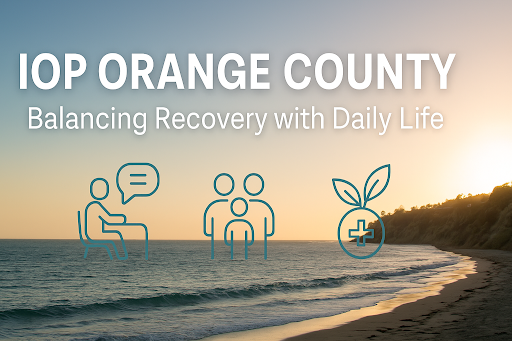IOP Orange County: Balancing Recovery with Daily Life

Addiction treatment has evolved to meet the needs of individuals who cannot step away from work, school, or family responsibilities. While traditional inpatient rehab provides intensive, structured care, many people require a more flexible option that still delivers effective treatment. That’s where IOP Orange County (Intensive Outpatient Program) comes in—offering the balance between recovery and everyday living.
In this article, we’ll explore how IOP programs in Orange County work, their benefits, and why they’re one of the best modern approaches to addiction recovery.
What Is an IOP?
An Intensive Outpatient Program (IOP) is a treatment option for individuals struggling with substance use or co-occurring mental health conditions who don’t need 24/7 residential care. IOPs typically include:
- Therapy sessions 3–5 times per week, usually 3–4 hours per day.
- A combination of individual, group, and family counseling.
- Skills training for relapse prevention, stress management, and healthy living.
- Dual-diagnosis treatment when both addiction and mental health challenges are present.
This approach provides structure and accountability, while allowing participants to continue living at home, working, or attending school.
Why Choose an IOP in Orange County?
Orange County has become one of the leading regions in the U.S. for addiction recovery. Here’s why enrolling in an IOP Orange County program is a smart choice:
1. Flexibility with Structure
IOPs allow you to build recovery into your daily routine. Instead of stepping away from life completely, you receive consistent treatment while balancing personal commitments.
2. Expert Clinical Care
Orange County IOPs are staffed with licensed therapists, addiction specialists, and medical professionals who use evidence-based practices like Cognitive Behavioral Therapy (CBT) and Dialectical Behavior Therapy (DBT).
3. Strong Community Support
The recovery community in Orange County is vibrant and welcoming. Alongside IOP participation, individuals can access 12-step meetings, support groups, and sober events daily.
4. Holistic Healing Approaches
Many programs in Orange County combine therapy with holistic practices like mindfulness, yoga, nutrition coaching, and exercise. These methods help participants heal both physically and emotionally.
5. Relapse Prevention and Life Skills
Recovery doesn’t stop when sessions end. IOPs emphasize teaching relapse-prevention strategies and life skills such as stress management, communication, and coping tools to handle triggers.
6. Family Involvement
Family members often play an essential role in recovery. Many IOPs in Orange County offer family counseling and educational workshops to rebuild trust and create supportive home environments.
Balancing Recovery with Daily Responsibilities
One of the unique strengths of an IOP Orange County program is its ability to help individuals balance recovery with the demands of daily life. Participants can continue:
- Working or attending school while receiving treatment.
- Caring for family members without being away for long periods.
- Applying recovery skills in real-world settings, making treatment more practical and sustainable.
This balance makes IOPs particularly effective for long-term success.
The Role of Aftercare in IOPs
Recovery doesn’t end with treatment. Many Orange County IOPs provide aftercare services, such as:
- Alumni support groups.
- Continued counseling sessions.
- Access to community recovery events.
This ongoing support helps ensure individuals stay connected and committed to sobriety long after the program ends.
FAQs About IOP Orange County
1. How long do IOP programs last?
Most programs run between 8–12 weeks, but the duration may vary depending on progress and personal needs.
2. Does insurance cover IOP treatment?
Yes, many insurance providers cover IOPs in Orange County. Always confirm with both your treatment center and insurance provider for details.
3. Can I still work while attending an IOP?
Absolutely. One of the main benefits of an IOP is that it allows participants to continue working, going to school, or caring for family while receiving treatment.
4. Who is best suited for an IOP?
IOPs are ideal for individuals who don’t require full-time residential care but need more support than weekly outpatient therapy. It’s also a great option for those transitioning from inpatient rehab.
5. Do IOPs address mental health as well as addiction?
Yes, many IOPs in Orange County provide dual-diagnosis treatment, addressing both addiction and co-occurring conditions like depression, anxiety, or PTSD.
Conclusion
Recovery is not a one-size-fits-all journey. For many individuals, an inpatient program may feel too restrictive, while traditional outpatient care may not provide enough support. An IOP in Orange County bridges that gap, offering the perfect blend of structured treatment and real-world flexibility.
With access to expert care, a supportive community, and a peaceful environment, Orange County provides an ideal setting for balancing recovery with everyday life. For those ready to take the next step toward sobriety without putting their entire life on hold, enrolling in an IOP could be the most effective choice.


